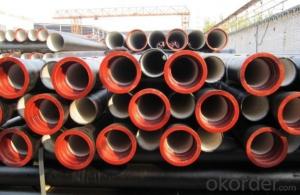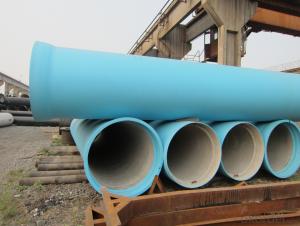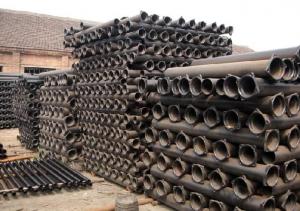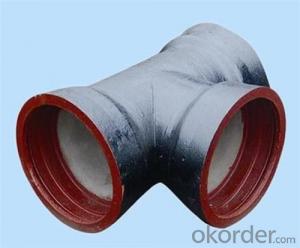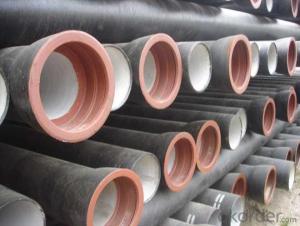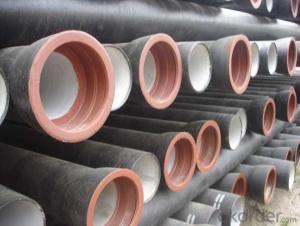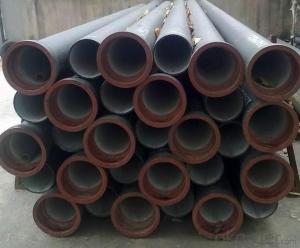Ductile Iron Pipe of China DN200 EN545 High Quality
- Loading Port:
- China main port
- Payment Terms:
- TT or LC
- Min Order Qty:
- 22 m.t.
- Supply Capability:
- 200000 m.t./month
OKorder Service Pledge
OKorder Financial Service
You Might Also Like
1,Ductile Iron Pipe Description :
1) Pipes confirm to ISO2531,K9 class,T type joint,6m long,with inside cements lining conform to ISO4179, outside Zinc spraying(130g/m2) and bitumen coating(70μm) conform to ISO8179.
2) Pipe ends: Spigot and socket ends, with 100% SBR rubber gaskets accoding to ISO4633
3) we can do third party inspection according to customer's request.
4) Our products have been sold to many international market, such as Middle East and South East Asia and Africa.
2,Main Features of the Ductile Iron Pipe:
•High yield strength
•High tensile Strength
•High corrosion resistance
•Pressure Resistence
•Anti-corrosion
•Installation is convenient
•Satisfy the highest hygienic standards
Length: 6m or cut into 5.6m, 5.7m, 5.8m
Internal Lining: Cement, conform to ISO4179
External coating: Zinc + Bitumen, conform to ISO8179
Rubber: NBR, SBR, EPDM according to ISO4633 / EN681.1
Note: The gaskets, bolts & nuts are supplied respectively as your special requirement
3,Ductile Iron Pipe Images:
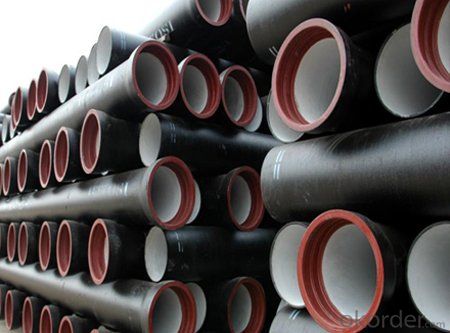
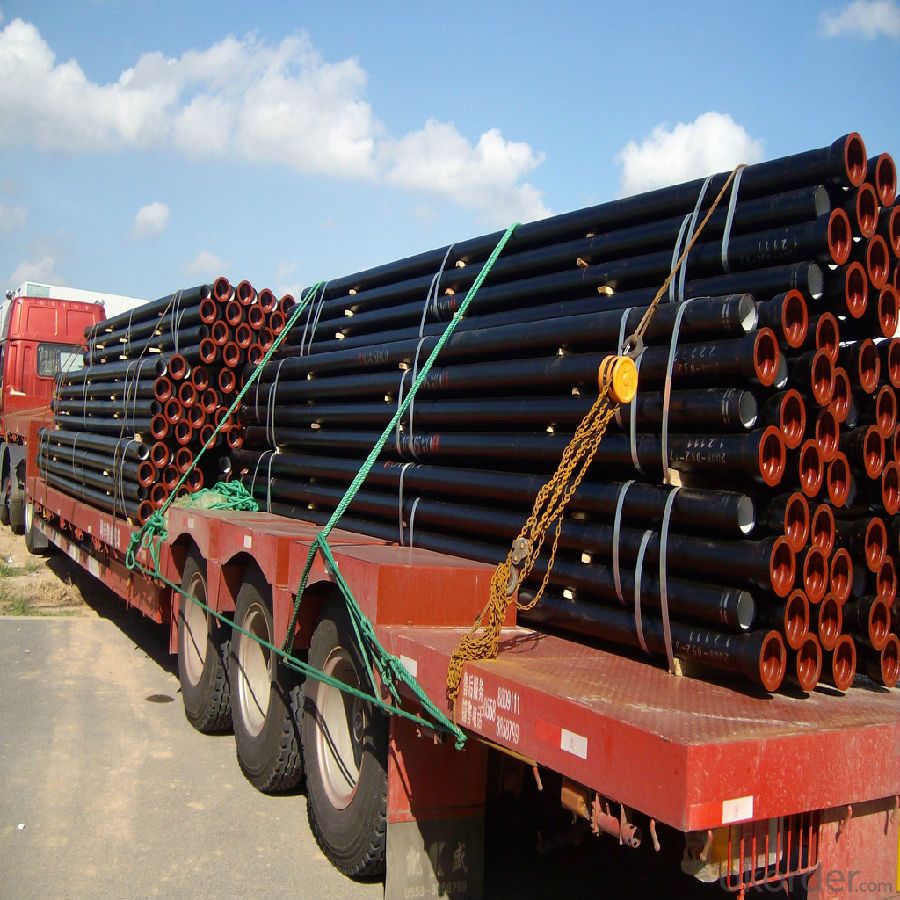
4. Ductile Iron Pipe Specification:
Processing service: Beveling, Threading, Slotting, Cut-to length, Bends, Quench and Temper, Fabrication, Double-jointing and On-site assistance
Documentary: MTC, material certification,Origin certification, CI or PI,Test Report, export licence, handling order, B/L,insurance policy,shipping instructions, contract, packing list etc.
Internal lining: ductile iron pipes shall have an internal cement mortar lining in acc with ISO4179.
External coating: ductile iron pipes shall be externally coated with metallic zinc spray plus a further layer of resin painting to ISO8179.
Gasket: 100% SBR/NBR/EPDM rubber gasket in accordance with ISO4633.
Packing: ductile iron pipes from DN100 to DN300 be bundled with steel belts, others are in bulk.
Payment term: L/C, T/T.
Packing: In bulk vessel or in container
5.FAQ:
We have organized several common questions for our clients,may help you sincerely:
1.Q: Why would you choose ductile iron pipe rather than other pipe materials?
A:The reasons are obvious for that not only ductile iron pipe possesses the inherent strength and flexibility of ductile iron, combined with proven corrosion protection systems, but also the cost savings can be achieved from design to installation and commissioning.
2.Q:Why can you guarantee the inner of pipes can’t be corroded?
A: High alumina cement mortar lining and sulphate-resistant cement mortar lining. These two special linings are applicable to inner anti-corrosion for sewage pipes, improving resistance to erosion of the sewage components.
- Q: Ductile cast iron can replace copper sleeve
- Under dry friction conditions, we design a pre - formed synovial membrane on the surface of the bearing to ensure that the solid lubricant is transferred to the dual parts in the shortest possible time, and an effective solid lubricant film is formed
- Q: What is the weight of ductile iron pipes compared to other materials?
- Compared to other commonly used materials in the construction industry, ductile iron pipes tend to be heavier. The weight of these pipes can vary depending on their specific size and dimensions, but they are usually heavier than materials like PVC, HDPE, and steel pipes. The primary reason for this increased weight is the dense nature of ductile iron, which grants it durability, strength, and resistance to corrosion. However, this weight also presents challenges in terms of transportation, installation, and handling, necessitating appropriate equipment and techniques for safe and efficient installation. Despite being heavier, ductile iron pipes offer numerous advantages in terms of longevity and performance in various applications.
- Q: How are ductile iron pipes transported and stored?
- Ductile iron pipes are typically transported and stored in a careful manner to ensure their integrity. They are commonly transported by trucks, rail, or waterways, using appropriate handling equipment such as cranes or forklifts. During transportation, they are secured to prevent any damage or movement that could affect their structural integrity. When it comes to storage, ductile iron pipes are usually stacked horizontally on stable surfaces, such as concrete or pallets, to prevent any deformation or bending. They are often stored in covered areas to protect them from weather elements that could cause corrosion or other damages. Additionally, pipes should be stored in a well-ventilated space to prevent moisture accumulation and potential rusting. Regular inspections are also conducted during storage to identify any signs of damage or deterioration. Overall, proper transportation and storage practices are crucial to maintain the quality and longevity of ductile iron pipes.
- Q: How is ductile iron pipe tested for quality?
- Extensive quality testing is carried out on ductile iron pipe to ensure its performance and reliability in various applications. The pipe undergoes a series of steps to assess its physical and mechanical properties. The hydrostatic pressure test is one of the main tests performed on ductile iron pipe. This test involves subjecting the pipe to fluid pressure that exceeds its designed operating pressure. The purpose is to determine if the pipe can withstand internal pressure without any leakage or failure. The pipe is filled with water or another suitable fluid, and the pressure is gradually increased to the required level. During this test, the pipe is carefully inspected for any signs of leakage or deformation. Another essential test is the tensile strength test, which measures the pipe's ability to resist pulling or stretching forces. A sample of the pipe is pulled until it breaks, and the maximum force applied during the test is recorded. This test helps determine important properties such as the pipe's ultimate tensile strength, yield strength, and elongation. The Charpy test is used to assess the pipe's impact resistance. In this test, a notched sample is struck with a swinging pendulum to measure the amount of energy absorbed by the pipe. It helps determine if the pipe can withstand sudden impacts or loads without fracturing. In addition to these tests, the pipe also undergoes various non-destructive tests, including ultrasonic testing, magnetic particle inspection, and visual inspection. These tests are crucial in detecting any internal or external defects, cracks, or abnormalities that could compromise the pipe's structural integrity. Furthermore, chemical analysis and metallographic examination are performed to evaluate the chemical composition and microstructure of the ductile iron pipe. These tests ensure that the pipe meets the necessary specifications and standards for its intended application. Overall, the testing process for ductile iron pipe is thorough and stringent. Its purpose is to guarantee the pipe's quality, durability, and overall performance in safely and efficiently delivering water, wastewater, or other fluids.
- Q: How does ductile iron pipe perform in areas with high groundwater salinity?
- Due to its inherent resistance to corrosion, ductile iron pipe is highly effective in areas with high groundwater salinity. The presence of elevated levels of salt and minerals in the groundwater can lead to the corrosion and deterioration of certain materials, but ductile iron is highly resilient to this type of corrosion. Its composition and manufacturing process make it less susceptible to damage from corrosive elements found in high salinity water. The primary reason for the corrosion resistance of ductile iron pipe lies in its protective iron oxide coating, which naturally forms on both the interior and exterior surfaces of the pipe. This coating acts as a barrier, preventing direct contact between the pipe and the corrosive elements present in the groundwater. Additionally, ductile iron pipes are often lined with cement mortar or a protective epoxy coating, further enhancing their resistance to corrosion and providing an extra layer of protection. Moreover, ductile iron pipe boasts an extended lifespan, often surpassing 100 years, making it an ideal choice for areas with high groundwater salinity. Its durability and resistance to corrosion ensure that it can withstand the harsh conditions associated with high salinity environments, minimizing the frequency of repairs or replacements. In conclusion, ductile iron pipe is an exceptional option for areas with high groundwater salinity due to its corrosion resistance properties. Its protective iron oxide coating, along with optional linings, offers a dependable and long-lasting solution, guaranteeing the integrity and performance of the pipe system even in demanding environments.
- Q: Will nodular cast iron pipes rust?
- Ductile iron pipe corrosion process is good, decided whether it will rust. Whether it will rust or not, the key is whether the anti-corrosion process of the nodular cast iron pipe is in place.
- Q: Are ductile iron pipes suitable for underground parking structures?
- Yes, ductile iron pipes are suitable for underground parking structures. They are strong, durable, and resistant to external pressures, making them ideal for use in underground environments where they can withstand heavy loads and potential ground movements. Additionally, ductile iron pipes have excellent corrosion resistance, ensuring long-term performance and minimal maintenance in underground parking structures.
- Q: Can ductile iron pipes be used for stormwater management?
- Certainly, stormwater management can make use of ductile iron pipes. Ductile iron, being a robust and enduring material, possesses resistance against corrosion and can endure the high rates of flow and pressure typically linked with stormwater management systems. These pipes have found extensive application across various fields, including stormwater drainage and sewage systems. Their capacity to handle substantial loads and endure environmental factors renders them an appropriate option for stormwater management, guaranteeing the smooth flow of water and averting flooding in urban regions. In addition, ductile iron pipes boast a lengthy lifespan, minimizing the necessity for frequent maintenance and replacement, thus proving to be a cost-effective selection for stormwater management infrastructure.
- Q: How long do ductile iron pipes last?
- Ductile iron pipes are known for their durability and long lifespan. On average, these pipes can last anywhere between 80 to 100 years, with some even lasting up to 150 years. The longevity of ductile iron pipes is attributed to their robust construction, which enables them to withstand high-pressure environments, resist corrosion, and endure extreme weather conditions. Additionally, ductile iron pipes have a proven track record of reliability and performance, making them a popular choice for water and wastewater infrastructure projects worldwide. Regular inspection and maintenance can further extend the lifespan of ductile iron pipes, ensuring their continued service for many decades.
- Q: What is the typical lifespan of ductile iron pipes?
- The lifespan of ductile iron pipes can differ based on multiple factors, including pipe quality, environmental conditions, and maintenance practices. On average, these pipes typically last approximately 75 to 100 years. This longevity establishes them as a sturdy and enduring choice for water and sewage transport systems. Through correct installation and consistent upkeep, these pipes can endure corrosion, pressure, and other external elements, guaranteeing their durability and dependability. Furthermore, advancements in coatings and linings have extended the lifespan of ductile iron pipes, making them an exceptional option for infrastructure projects.
Send your message to us
Ductile Iron Pipe of China DN200 EN545 High Quality
- Loading Port:
- China main port
- Payment Terms:
- TT or LC
- Min Order Qty:
- 22 m.t.
- Supply Capability:
- 200000 m.t./month
OKorder Service Pledge
OKorder Financial Service
Similar products
Hot products
Hot Searches
Related keywords
